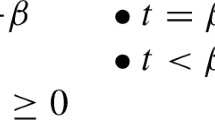Abstract
Representing and reasoning with an agent’s preferences is important in many applications of constraints formalisms. Such preferences are often only partially ordered. One class of soft constraints formalisms, semiring-based CSPs, allows a partially ordered set of preference degrees, but this set must form a distributive lattice; whilst this is convenient computationally, it considerably restricts the representational power. This paper constructs a logic of soft constraints where it is only assumed that the set of preference degrees is a partially ordered set, with a maximum element 1 and a minimum element 0. When the partially ordered set is a distributive lattice, this reduces to the idempotent semiring-based CSP approach, and the lattice operations can be used to define a sound and complete proof theory. A generalised possibilistic logic, based on partially ordered values of possibility, is also constructed, and shown to be formally very strongly related to the logic of soft constraints. It is shown how the machinery that exists for the distributive lattice case can be used to perform sound and complete deduction, using a compact embedding of the partially ordered set in a distributive lattice.
Similar content being viewed by others
References
Benferhat, S., S. Lagrue, and O. Papini. (2002). “Reasoning with Partially Ordered Information in a Possibilistic Logic Framework.” In Proceedings of IPMU 2002, pp. 1047–1052.
Bertele, U. and F. Brioschi. (1972). Nonserial Dynamic Programming, Academic Press.
Bistarelli, S., T. Fruewirth, M. Marte, and F. Rossi. (2004). “Soft Constraint Propagation and Solving in Constraint Handling Rules.” Computational Intelligence, Special Issue on Preferences in AI and CP.
Bistarelli, S., U. Montanari, F. Rossi, T. Schiex, G. Verfaillie, and H. Fargier. (1999). “Semiring-Based CSPs and Valued CSPs: Frameworks, Properties and Comparison.” Constraints 4(3), 199–240.
Bistarelli, S., U. Montanari, and F. Rossi. (1997). “Semiring-Based Constraint Solving and Optimization.” Journal of the ACM (JACM) 44(2), 201–236.
Bistarelli, S., U. Montanari, and F. Rossi. (2001). “Semiring-Based Constraint Logic Programming: Syntax and Semantics.” ACM Transactions on Programming Languages and Systems.
Bistarelli, S., U. Montanari, and F. Rossi. (2002). “Soft Concurrent Constraint Programming.” In Proc. 11th European Symposium on Programming (ESOP), Lecture Notes in Computer Science (LNCS), Springer, pp. 53–67.
Bistarelli, S. (2004). Semirings for Soft Constraint Solving and Programming, Springer.
Boutilier, C., R.I. Brafman, H.H. Hoos, and D. Poole. (1999). “Reasoning with Conditional Ceteris Paribus Preference Statements.” In Proceedings of the Fifteenth Conference on Uncertainty in Artificial Intelligence (UAI99), pp. 71–80.
Boutilier, C., R. Brafman, C. Domshlak, H. Hoos, and D. Poole. (2004). “CP-Nets: A Tool for Representing and Reasoning with Conditional Ceteris Paribus Statements.” JAIR 21, 135–191.
Dechter, R. and I. Rish. (2003). “Mini-Buckets: A General Scheme for Bounded Inference.” Journal of the ACM 50(2), 107–153.
Dechter, R. (1999).“Bucket Elimination: A Unifying Framework for Reasoning.” Artificial Intelligence, 113.
Dubois, D., J. Lang, and H. Prade. (1991). “Timed Possibilistic Logic.” Fundamenta Informaticae, XV.
Dubois, D., J. Lang, and H. Prade. (1994). Possibilistic Logic, Pages 439–513. In: Handbook of Logic in Artificial Intelligence and Logic Programming, Vol. 3, D. Gabbay, C. Hogger and J. Robinson (eds.), Oxford University Press.
Fargier, H., J. Lang, and T. Schiex. (1993). “Selecting Preferred Solutions in Fuzzy Constraint Satisfaction Problems.” In Proc. of the first European Congress on Fuzzy and Intelligent Technologies.
Garey, M.R. and D.S. Johnson. (1979). Computers and Intractability: A Guide to the Theory of NP-Completeness. W.H. Freeman and Company, New York.
Kohlas, J. and P. Shenoy. (2000). Computation in Valuation Algebras. In: Kohlas, J., Moral, S., (eds.) Algorithms for Uncertainty and Defeasible Reasoning, Volume 5, Handbook of Defeasible Reasoning. Kluwer Academic Publishers.
Kohlas, J. (2003). Information Algebras, Springer, London.
Schiex, T., H. Fargier, and G. Verfaillie. (1995). “Valued Constraint Satisfaction Problems: Hard and Easy Problems.” In Proc. IJCAI-95, pp. 631–637.
Shenoy, P.P. and G. Shafer. (1990). “Axioms for Probability and Belief Function Propagation.” In Uncertainty in Artificial Intelligence 4, pp. 575–610.
Shenoy, P. P. (1992). “Valuation-Based Systems: A Framework for Managing Uncertainty in Expert Systems.” Fuzzy Logic for the Management of Uncertainty.
Wilson, N. (2003). “A Logic of Partially Satisfied Constraints.” In Soft'03: Fifth International Workshop on Soft Constraints.
Wilson, N. (2004a). “Extending CP-Nets with Stronger Conditional Preference Statements.” In Proceedings of AAAI-04, pp. 735–741.
Wilson, N. (2004b). “Soft Constraints with Partially Ordered Preferences (short paper).” In Proc. European Conference on Artificial Intelligence, pp. 1111–1112.
Wilson, N. (2005). “Decision Diagrams for the Computation of Semiring Valuations.” In Proceedings of the Nineteenth International Joint Conference on Artificial Intelligence (IJCAI-05), pp. 331–336.
Author information
Authors and Affiliations
Corresponding author
Rights and permissions
About this article
Cite this article
Wilson, N. A logic of soft constraints based on partially ordered preferences. J Heuristics 12, 241–262 (2006). https://doi.org/10.1007/s10732-006-6347-5
Issue Date:
DOI: https://doi.org/10.1007/s10732-006-6347-5




